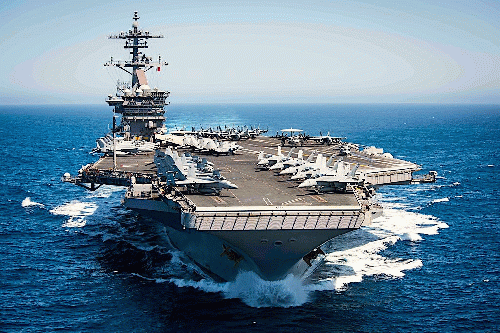From Consortium News
The United States is experiencing an upheaval from the Coronavirus pandemic that is deeper than anything in modern American history, and military and civilian Pentagon elites have responded to it in a way that seems certain to further magnify the broader corrosive impact of the crisis on their enormous power.
It has further widened the existing socio-political seam between those elites and their servicemen and women who have faced a threat to their health not only from the pandemic itself but from the decisions made by military bureaucrats directly affecting their safety.
That is the larger significance of the dramatic recent events involving Captain Brett Crozier, the crew of USS Theodore Roosevelt and the hapless, now-cashiered Navy Secretary Thomas Modly.
Modly had made the most embarrassing public appearance of a senior official in recent history on board the stricken aircraft carrier after having relieved Captain Crozier, who had received an unprecedented standing ovation from his crew as he walked to shore.
Modly not only attacked Crozier, suggesting he was "stupid" to circulate his letter urging immediate action to evacuate sailors from the ship but was condescending to the crew as well. (584 TR Roosevelt crew, including Crozier, have tested positive and on Monday the first died.)
Modly's rambling and profanity-laced talk to the crew clearly conveyed the official view that they had no business cheering their Captain, who had stood up for their interests, because he had embarrassed the "chain of command."
Modly thus dramatically illustrated the wide gulf that separates military and civilian Pentagon elites from the lives of U.S. servicemen and women. The interests of the senior military and civilian officials in the Pentagon have always focused primarily on their missions and capabilities, which are the tokens of their power and prestige.
The health of soldiers and sailors has inevitably emerged as a secondary consideration, despite official protestations to the contrary. That much is clear from a review of the press briefing given by Modly and Chief of Naval Operation Admiral Michael Gilday on March 24, after the first three cases of Covid-19 had been identified on the Theodore Roosevelt.
Gilday revealed in the briefing that the Navy was only testing when there was evidence of symptoms and not for all sailors on board the ship.
The Navy Surgeon General Rear Admiral Bruce Gillingham further explained the Navy was doing "surveillance testing," which he described as "cross section" testing, to "give us an idea," rather testing all the sailors onboard. When another reporter asked how concerned the Navy was about a new cluster of cases emerging onboard, Gillnghham didn't address that question and instead answered another question the reporter had posed.
Even more revealing of the Navy's priorities, however, were the responses to a journalist's observation that the Navy did not appear to have a coherent position guiding commanders in regard to maintaining social distance onboard. Modly said it was "almost impossible to try to micromanage these types of decisions," and Gilday added, "We really do trust the judgment of our commanders, and so we're giving them authority to do what they think they need to do to remain on mission and take care of people."
Other Carriers Hit With Virus
Commanding officers could hardly have missed the clear implication that they were to "remain on mission" and do the best they could to deal with the risk of a Covid-19 outbreak that would inevitably be significant. By the time of that press briefing, of course, the virus was already spreading rapidly on the Theodore Roosevelt, and within days, it was a severe emergency demanding radical action.
The full story of what happened during those crucial days is still untold, but Captain Crozier obviously met resistance from the "chain of command" to his call for immediate evacuation of a very large number of the 4,000 sailors from the ship, leaving behind about 1,000 to maintain the nuclear reactors and the billions of dollars of weapons on-board.
(Note: You can view every article as one long page if you sign up as an Advocate Member, or higher).






